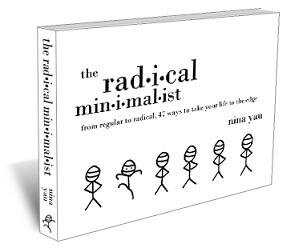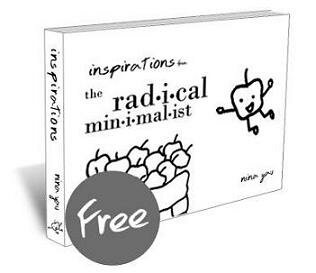Henry David Thoreau on Minimalism, Life and Dreams

Every creature is better alive than dead, men and moose and pine trees, and he who understands it aright will rather preserve its life than destroy it. – Henry David Thoreau
Henry David Thoreau (1817-1862), an American author, naturalist, transcendentalist, pacifist, tax resister and philosopher, is most famous for his work entitled Walden. Published in 1854, Thoreau documented his 2 years’ of having built a cabin next to Walden Pond, in Concord, Massachusetts, and how he truly went back to the roots of human nature in order to live simply, enjoy the beautiful (and harsh) moments in life, and what it means to escape (even back then) the ever-growing consumerist society. Thoreau was a great and radical thinker, to this day and especially during his time in the 1800s. We can certainly learn a lot from this profound philosopher.
Thoreau is one of my very favorite philosophers and a favorite amongst many folks who enjoy living simply and/or minimally. Why is that?
Let us examine 5 key passages from Walden to see why:
Passage 1: On What Man Knows
Men say they know many things;
But lo! they have taken wings,–
The arts and sciences,
And a thousand appliances;
The wind that blows
Is all that any body knows.
Isn’t that the truth? “The wind that blows is all that any body knows.”
Humans have come a long, long way from even just 20 years ago. We are continuously growing, evolving, changing, and doing things better, faster, stronger than ever before.
But to the root of all this, can we say we know anything, anything at all? I know what it feels like to be doing what I love to do: Art, Writing, Reading, and Karate. I feel alive, I feel great, and I feel this is who I am, who I was made to be. Can you say the same thing about your life?
Passage 2: On the Unnecessary Complexities of Life
The animal merely makes a bed, which he warms with his body in a sheltered place; but man, having discovered fire, boxes up some air in a spacious apartment, and warms that, instead of robbing himself, makes that his bed, in which he can move about divested of more cumbrous clothing, maintain a kind of summer in the midst of winter, and by means of windows even admit the light, and with a lamp lengthen out the day.
Now I’m not dis-advocating the obvious benefits of man having discovered fire, or any other evolutionary miracle for that matter. In fact, I’m very, very glad we have!
What I believe Thoreau is getting at in this passage is the fact that sometimes man makes things more complicated than it ought to be. He compares our necessity to the “luxuries” in life when a little animal just does what nature intended it to do: simply make up a bed (a nest, a cave, a burrow, a tree) and warm yourself up with your own body heat and whatever nature has around you. That is all you ever need.
Of course, as humans, we need more than just a warm bed. We need human interaction, we need love, we need satisfaction from a job well done, we need purpose. These things we need ought not to take up much money or space. Nor does it need to lie in our possessions or material wants and desires. Can we give up our thirsty desire for that which won’t bring us lasting happiness?
Passage 3: On Listening to Your Own Little Drummer
Why should we be in such desperate haste to succeed, and in such desperate enterprises? If a man does not keep pace with his companions, perhaps it is because he hears a different drummer. Let him step to the music he hears, however measured or far away.
This passage is wonderfully observant. I believe we all have within us our “little drummer” that if we just stepped to his pace, we can find great balance, joy and happiness in life.
Yet the vast masses squished their inner drummer due to multiple reasons:
- The need to “fit in.” To not look like an outcast; someone different and strange.
- The desire to keep up with the “stars” we’ve elevated them to be. Who has the most fashionable or trendy designer glasses, shoes, handbags, clothes, gear, electronics, houses, cars.
- Not allowing ourselves to follow what is deep within us. Ignoring our dreams, our passionate pursuits, that which what makes us come alive, our ambitious and lofty goals that others downplay or call crazy.
- The complacent response to an average lifestyle.
Here’s how to stop letting others determine the pace you should set for your life and to start listening to your inner drummer:
- Don’t try to fit in. You were meant to stand out, to stand apart from the others. You are unique. You are talented in your own artistic ways. You are you. Be proud of that fact.
- Squelch the desire to have the latest and greatest. It’s a waste of money, time and energy. Instead, be content with what you do have. Focus on the priceless commodities: your family, your health, your abilities, your relationships with others.
- Allow yourself to follow your inner artist child who has always dreamt you can do great things with your life … if you only listened to him and stopped making excuses.
- Be dissatisfied with just being average and allowing your bar of standard to be the status quo.
Passage 4: On Loving Your Life
However mean your life is; meet it and live it; do not shun it and call it hard names. It is not so bad as you are. It looks poorest when you are richest. The fault-finder will find faults even in paradise. Love your life, poor as it is.
“Love your life, poor as it is.” Simply profound.
Isn’t it the truth that those who are fault-finders, aka perfectionists, are never satisfied?
See if you recognize yourself in any of the following examples, or have experienced it on the receiving end:
- The parent who scolds his child when she brings home 6 A’s and 1 B on the latest report card. That B sticks out like a sore thumb, demanding a “What happened here? You have some explaining to do. How can you let Science/Math/English/Reading slip by so carelessly? Are you stupid? What’s wrong with you?”
- The never-satisfied boss who demands why you let the Customer Data Project become delayed when you did excellent on all your other projects thus far. A rather cynical venom-spewing remark downplays all the good you’ve done up to then: “What’s going on? How can you let this project drag on? I thought you were competent enough to handle this project, to drive it with stellar results. I had expected more from you.”
- The partner who always brings up the small, insignificant events just when it’s the most painful: “You know, your mother was right. You are a lazy person. Remember how I had asked you to pick up the medicine from the drugstore that one night and you were complaining how “exhausted” you were from work? God, how selfish. You couldn’t even do that one little thing.”
It’s painful, being a perfectionist or fault-finder, and even more so when one is on the receiving end of a perfectionist’s war-path of destructive comments and criticisms.
Can you see yourself letting go of the need to be perfect in all that you do?
- Let go of the need to look perfect and immaculate each time you step outside. Style is being who you are, not what you wear.
- Let go of the need to cross all your T’s, dot all your I’s. Sometimes it’s better to just launch your product/project than to continually delay it due to minor edits and revisions that won’t always make a difference.
- Let go of the need to receive your boss’/partner’s/parent’s/child’s approval and attention. Learning to be self-sufficient first allows yourself to not become so dependent and debilitated when you don’t receive such desired approval and attention from others. I once was in a very destructive relationship where the cycle of wanting and needing each other’s approval and attention led to its final demise. By leaning on each other too much, we learned to not be ourselves and to just let go of what we cannot control — each other.
Passage 5: On Advancing Confidently in the Direction of Your Dreams
I learned this, at least, by my experiment; that if no one advances confidently in the direction of his dreams, and endeavors to live the life which he has imagined, he will meet with a success unexpected in common hours. He will put some things behind, will pass an invisible boundary; new, universal, and more liberal laws will begin to establish themselves around and within him; or the old laws be expanded, and interpreted in his favor in a more liberal sense, and he will live with the license of a higher order of beings. In proportion as he simplifies his life, the laws of the universe will appear less complex, and solitude will not be solitude, nor poverty poverty, nor weakness weakness. If you have built castles in the air, your work need not be lost; that is where they should be. Now put the foundations under them.
This is what Castles in the Air means. Confidently going in the direction of one’s dreams. By doing so, the universe opens up infinite opportunities and possibilities.
By taking the risk and jumping, the net will appear in ways you cannot imagine. If you never take risks and leap without knowing whether you’ll come out alive or not, you’ll never realize if the net will be there for you when you jump.
Safety on the edge means you’ll always look into the horizon wishing your life could be this or could be that. Stop wishing and start doing.
Be Like Thoreau …
… and live simply, love your life, and advance confidently in the direction of your dreams.
By giving up unnecessary material wants and desires, by loving your life with all the faults it has, by boldly going where your heart leads you … that is where true happiness and joy in life lies.
Celebrate Minimalism!
In celebration of the First Annual International Minimalist Day that just passed on September 23 (thanks to Karol Gajda!), please share with others how you are living a more minimalist life. Post on your own blog your thoughts about living a minimalist life or how you are trying to become more minimal. There will be challenges, of course, but we minimalists are here to help one another.
There is a huge movement in minimalism, if you haven’t noticed. And it’s moving fast. It’s not just a phase, it’s not just a fad, it’s not just a few handful extremists who are denouncing the consumerist ways of the world. This is real and it’s happening now.
Will you join me, as we forgo the so-called “luxuries” in life for the simplicity and beauty that material goods cannot ever give us? I hope you do.
Let minimalism not be a passing thing, just a “phase” you’re going through. Francine Jay, aka Miss Minimalist, agrees minimalist living is an important new movement. It is a lifestyle, a philosophy, and way of thinking and doing things, in a way that wasn’t thought of before or done before. Together, we can change the future of the world as we know it.
**
I was recently interviewed by reporter Katherine Laidlaw of the National Post newspaper for an article she wrote entitled “The Urge to Purge.” :) Check it out sometime.
It is my hope that this post has inspired you in some way, however little it may be. If it has, please do share the love with others. I really appreciate it! Find me on and . And now, Castles in the Air has its own ! Sweet. Be well, my friends!

 My name is Nina Yau, author of
My name is Nina Yau, author of 







